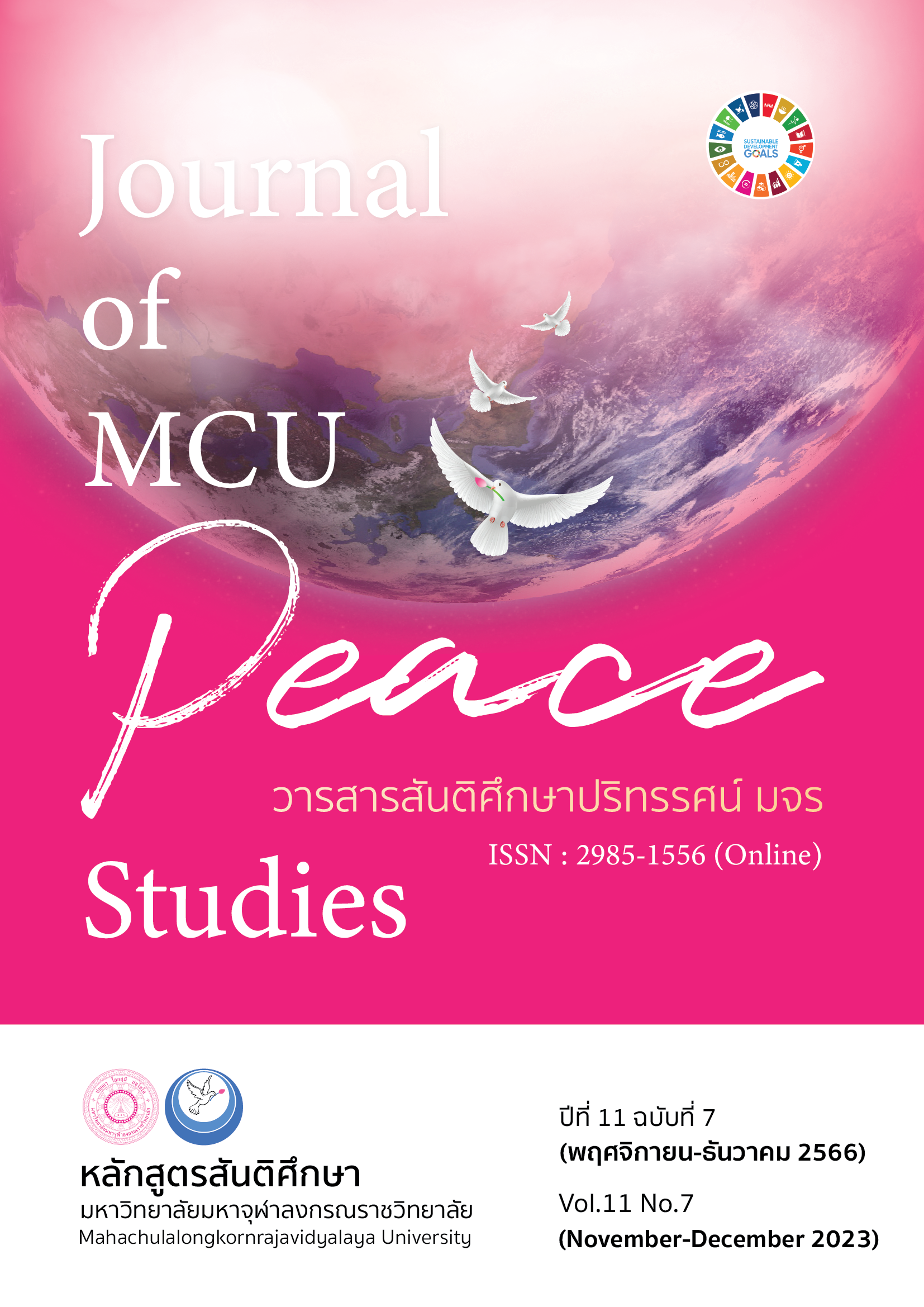การวิเคราะห์องค์ประกอบปัจจัยการดำเนินงานวิสาหกิจชุมชนกลุ่มแปรรูปและผลิตภัณฑ์อาหารภาคกลางตอนล่าง
Main Article Content
บทคัดย่อ
วิสาหกิจชุมชน ดำเนินงานโดยคณะบุคคลที่มีวิถีชีวิตร่วมกัน นำความรู้ ภูมิปัญญาและทรัพยากร มาผลิตสินค้าก่อให้เกิดการสร้างงานสร้างรายได้ ส่งผลให้ชุมชนสามารถพึ่งพาตนเองได้ วิสาหกิจชุมชนจะมีความยั่งยืนได้นั้นต้องดำเนินงานที่ทันสมัยพร้อมรับกับการเปลี่ยนแปลง บทความวิจัยนี้จึงมีวัตถุประสงค์ เพื่อวิเคราะห์องค์ประกอบปัจจัยการดำเนินงานของวิสาหกิจชุมชนกลุ่มแปรรูปและผลิตภัณฑ์อาหาร ในเขตภาคกลางตอนล่าง กลุ่มตัวอย่างในงานวิจัยนี้เป็นสมาชิกวิสาหกิจชุมชน จำนวน 365 คน ซึ่งมาจากวิสาหกิจชุมชนกลุ่มแปรรูปและผลิตภัณฑ์อาหารภาคกลางตอนล่าง 2 ที่ได้รับรางวัลวิสาหกิจชุมชนดีเด่น ในช่วงปี พ.ศ. 2560 - พ.ศ. 2565 จำนวน 24 แห่ง ในพื้นที่ 4 จังหวัด ได้แก่ จังหวัดประจวบคีรีขันธ์ เพชรบุรี สมุทรสงคราม และสมุทรสาคร เครื่องมือที่ใช้เป็นแบบสอบถามมีลักษณะเป็นแบบมาตราส่วนประมาณค่า 5 ระดับ สถิติที่ใช้ในการวิเคราะห์ข้อมูล ได้แก่ ค่าความถี่ ค่าร้อยละ ค่าเฉลี่ย ส่วนเบี่ยงเบนมาตรฐาน และวิเคราะห์องค์ประกอบเชิงสำรวจ โดยสกัดองค์ประกอบด้วยเทคนิควิธีวิเคราะห์องค์ประกอบหลัก และหมุนแกนแบบออโธกอนอลด้วยวิธีแวริแมกซ์และค่าความแปรปรวนค่าไคสแควร์
ผลการวิจัยพบว่า องค์ประกอบปัจจัยการดำเนินงานวิสาหกิจชุมชนกลุ่มแปรรูปและผลิตภัณฑ์อาหาร ภาคกลางตอนล่าง ประกอบด้วย 6 องค์ประกอบหลัก ได้แก่ 1) ด้านการมีส่วนร่วมของสมาชิก มี 13 ปัจจัย 2) ด้านการบริหารจัดการ มี 11 ปัจจัย 3) ด้านการตลาด มี 6 ปัจจัย 4) ด้านภาวะผู้นำ มี 5 ปัจจัย 5) ด้านการผลิต มี 4 ปัจจัย และ 6) ด้านวัตถุดิบ มี 4 ปัจจัย ผลที่ได้สามารถนำมาอธิบายความสอดคล้องขององค์ประกอบปัจจัยการดำเนินงานของวิสาหกิจชุมชนกลุ่มแปรรูปและผลิตภัณฑ์อาหารเขตภาคกลางตอนล่างได้ร้อยละ 76.999 ผลการวิจัยนี้แสดงให้เห็นถึงองค์ประกอบของปัจจัยการดำเนินงานวิสาหกิจชุมชนกลุ่มแปรรูปและผลิตภัณฑ์อาหาร ภาคกลางตอนล่างซึ่งได้มีการจัดทำเป็นรูปแบบสำหรับให้วิสาหกิจชุมชนกลุ่มแปรรูปและผลิตภัณฑ์อาหารนำไปประยุกต์ใช้ได้ต่อไป
Article Details

อนุญาตภายใต้เงื่อนไข Creative Commons Attribution-NonCommercial-NoDerivatives 4.0 International License.
ทัศนะและความคิดเห็นที่ปรากฏในบทความในวารสาร ถือเป็นความรับผิดชอบของผู้เขียนบทความนั้น และไม่ถือเป็นทัศนะและความรับผิดชอบของกองบรรณาธิการ ยินยอมว่าบทความเป็นลิขสิทธิ์ของวารสาร
เอกสารอ้างอิง
Anusonphat, N., & Poompurk, C. (2022). New Normal Ways for The Survival and Adaptation of Community Enterprise after COVID-19 Crisis of Thailand. Journal of MCU Nakhondhat, 9(1), 1-19.
Chaichua, K., & Sangmahachai, S. (2022). Leadership and Effectiveness of Community Enterprises in Thailand. Interdisciplinary Social Sciences and Communication Journal, 5(4), 1-11.
Community Enterprise Promotion Division. (2018). Outstanding Community Enterprise 2018. Bangkok: New Thammada Press (Thailand) Co., Ltd.
Community Enterprise Promotion Division. (2021). Outstanding Community Enterprise 2021. Bangkok: New Thammada Press (Thailand) Co., Ltd.
Department of Agricultural Extension. (2018). Report on the Number and Members of Community Enterprises and Community Enterprise Networks that Approved Registrations Classified by Country Location. Retrieved May 20, 2022, from http://smce.doae.go.th/smce1/report/reportsmcemember.php
Department of Agricultural Extension. (2020). Report on the Number of Community Enterprises Registered with the Department of Agricultural Extension. Retrieved May 20, 2022, from http://smce.doae.go.th/aboutus.php
Faicharoenmongkol, W., & Chiangchana, J. (2020). Factors that Influence the Success of the Outstanding Provincial Community Enterprise in 2017 – 2019. Community Enterprise Promotion Division.
Ferketich, S. (1991). Focus on Psychometrics: Aspects of Item Analysis. Research Nursing Health, 14(2), 165-168.
Gorsuch, R. L. (1983). Factor Analysis. (2nd ed.) Hillsdale NJ: Erlbaum.
Hair, J. F., Black, W. C., Babin, B. J., & Anderson, R. E. (2010). Multivariate Data Analysis. (7th ed.). Upper Saddle River, New Jersey: Prentice Hall.
Kaewkaunkhai, T. (2018). Comparative Analysis of the Survival Management of the Silkworm Community Group, Ban Dan District, Buri Ram Province. Journal of Economics and Management Strategy, 5(2), 67-86.
Kanokhong, K. (2018). A Guideline for Development and Management of Organic Vegetable Community Enterprise Network in Chiang Mai Province. Journal of Community Development and Life Quality, 6(2), 261-270.
Laophuangsak, P. (2014). Development of Management Model for Community Enterprise's Cluster for Enhancing Competitiveness of Community Economy in Western Region. (Doctoral Dissertation). Silpakorn University. Bangkok.
Ooaymaweerahirun, P. (2023). The Next Normal Adaptation Model for Community Enterprises in the Food Processing and Product Groups in the Lower Central Region. (Doctoral Dissertation). Rajamangala University of Technology Phra Nakhon. Bangkok.
Paekul, N., Sutthinarakorn, W., & Jeerapattanatorn, P. (2021). Operational Management of Nakhon Nayok Province Food Processing Community Enterprise. Journal of Humanities and Social Sciences Nakhon Phanom University, 11(3), 343-356.
Phatratkul, S., Sangthongluan, C., Punoiam, K., & Siranwarissara, A. (2023). Development of Marketing Strategies for Community Enterprises in the Processed Food Category from Pineapples in the Lower Central Region Group 2. Journal of Academic for Public and Private Management, 5(1), 64-82.
Phueakbuakhao, W. (2021). Model for Developing Food Community Enterprise Leadership in Prachuap Khiri Khan Province Based on Sufficiency Economy Concept. Journal of Humanities and Social Sciences Surin Rajabhat University, 20(2), 223-236.
Phunboonmee, S. (2021). Digital Transformation from New Normal to Next Normal. Retrieved May 20, 2022, from https://www.depa.or.th/th/article-view/digital-transformation-new-normal-next-normal
Provincial Group Strategy. (2020). Provincial Group Development Plan 2023-2027. Retrieved May 20, 2022, from https://www.osmcentral-s2.moi.go.th/2021/dev_plan


